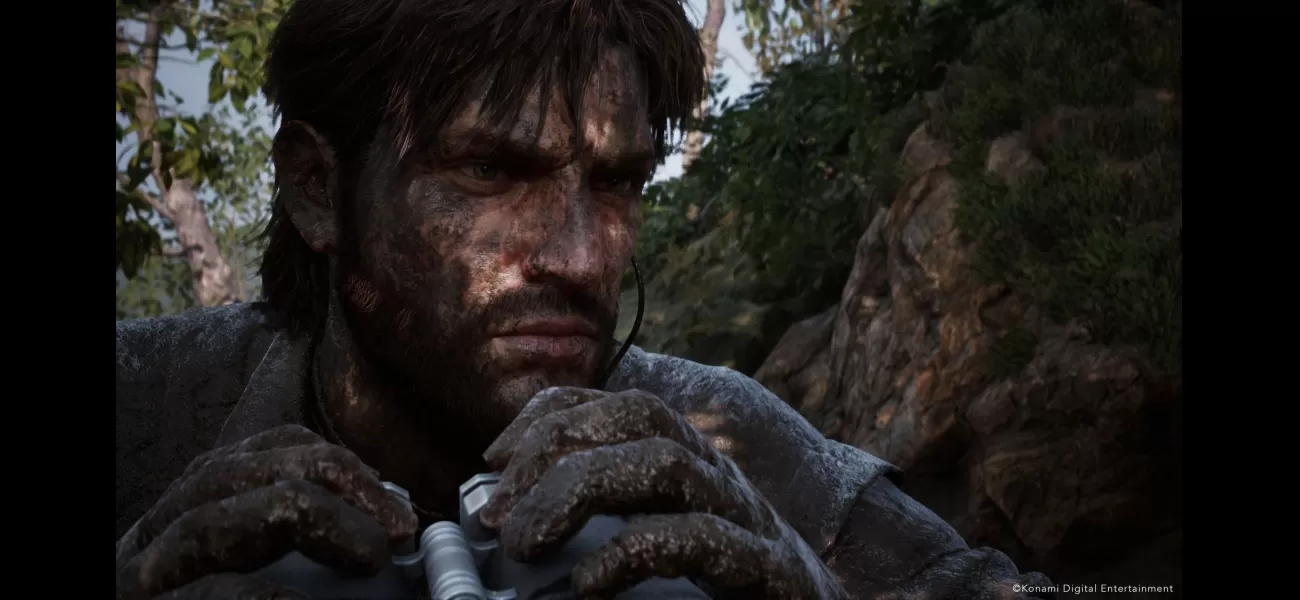"Hands-on preview and interview for Metal Gear Solid Delta remake, featuring classic stealth gameplay."
GameCentral interviews the Metal Gear Solid 3 remake producer on remaking a classic and the potential for a new game.
August 27th 2024.

Metal Gear Solid Delta: Snake Eater - a refined and enhanced version of the beloved classic game. Recently, GameCentral had the opportunity to speak with the producer of the Metal Gear Solid 3 remake, where they discussed the process of remaking a fan-favorite and the potential for a new addition to the franchise.
It's been almost two decades since the release of Metal Gear Solid 3: Snake Eater, which is often considered the pinnacle of the series. However, it has also been nine years since Hideo Kojima's departure from Konami, and it's become apparent that the company has struggled to continue the Metal Gear legacy without him. With the release of the Master Collection, it seemed that remakes were the only logical direction for the franchise to take.
The question then became which game to start with. While Metal Gear Solid on PS1 may seem like the obvious choice, it would require a significant amount of work to meet modern standards, especially for those who have never played the game before. That's why Metal Gear Solid 3, which takes place chronologically before the others, was chosen as the starting point. Producer Noriaki Okamura confirmed this when we had the chance to play the game earlier this month, although he remained tight-lipped about other details.
"We decided to do the remake because we noticed that there is a younger generation of gamers who are either unfamiliar with the series or have never played a Metal Gear Solid game," Okamura explained. "While we did release the Master Collection with Metal Gear Solid 1, 2, and 3, it still felt outdated and may not appeal to new players in the way it was originally intended. That's why we felt the need to embark on this project."
One interesting aspect of Metal Gear Solid 3 is that, despite being only six years younger than the first game, it is the earliest installment in the timeline. This, combined with its reputation as a standalone gem, is why it was chosen for the remake. "We often get asked by people which game they should start with if they've never played before," Okamura added. "Chronologically, it makes sense to begin at the beginning of the story. And it's a great standalone game, so you don't necessarily need to have played the others to enjoy it or understand the story."
During our demo, we were able to play through the opening of the game until the first encounter with The Boss. This may not seem like a lot, especially for those who have played the original, but the last time we played this game was on the 3DS in 2012. However, memories of the game began flooding back, and it was interesting to see that while there is a new over-the-shoulder camera view, the remake remains faithful to the original design.
There are some subtle changes, such as a dedicated roll button and the ability to drop to the ground from a standing position instead of needing to crouch first. The game now also features a compass and on-screen objective reminders to make it clearer where you need to go. However, the story remains the same, with the same voice actors and dialogue, and identical cutscenes - just with improved graphics. It's challenging to judge the visuals without seeing more, as the game was originally designed for the PlayStation 2, making it feel more like a remastered version rather than a complete remake. However, the realistic mud that can deform and trap you if you remain still for too long is quite impressive.
The team faced some challenges during the graphics upgrade process, as some of the new visuals didn't blend well with the gameplay. "We realized that some of the new graphics weren't compatible with the gameplay mechanics," Okamura shared. "For example, the character movements and animations started looking clunky and outdated. However, our goal wasn't to create a brand new Metal Gear game. That's why we only made changes or improvements that we felt were necessary. The game still feels like Metal Gear Solid 3, without feeling like a 20-year-old game. We hope that even for those who are new to the stealth genre or haven't played it in a while, this remake still captures the thrill of the original game. However, it was not our intention to modernize the stealth mechanics."
One notable aspect of the game is that the level design remains the same as the original, with each area being its own individual map, connected by short transitions. This is a clear indication of the game's age, as modern games often feature one large, open world. Another sign is that the game's stealth is incredibly challenging. Compared to more simplified, modern stealth games like Star Wars Outlaws, Metal Gear Solid Delta requires a higher level of skill and patience. This is because stealth is the primary gameplay mechanic, which is rare in today's games, where it is usually just a small aspect.
This means that the game takes the concept of staying hidden very seriously, with percentage indicators of your visibility and a range of unique options and equipment. One of the most well-known features is the ability to change camouflage to match your surroundings, although it's worth noting that since the game is set in 1964, the implication is that the character is changing clothes every time, which is quite absurd. Unfortunately, the change occurs off-screen, so we don't get to see how it happens.
If you're feeling intimidated by the game's difficulty, it's not necessarily because the game is hard, but rather because it requires a skill that is seldom utilized in modern games - patience. By observing the patrol routes of guards from cover, you can find a weakness in their defenses. Similarly, combat should be avoided as much as possible, as extended contact with enemies will often lead to an unwinnable firefight.
It's clear that a lot of thought and effort has gone into the Metal Gear Solid Delta remake, and it's exciting to see how it will appeal to both longtime fans and new players. With a perfect balance of modern and retro elements, it's sure to bring back fond memories for those who played the original, while also attracting a new generation of gamers to the beloved franchise.
The excitement is palpable as the highly anticipated remake of Metal Gear Solid 3: Snake Eater, titled Metal Gear Solid Delta, is finally here. Fans have been eagerly awaiting this new and improved version of the classic game, and GameCentral was lucky enough to speak with the producer himself, Noriaki Okamura, to get all the behind-the-scenes details.
It's been almost two decades since the original release of Metal Gear Solid 3, which is widely regarded as the best game in the series. However, it's been nine years since creator Hideo Kojima left Konami, leaving fans wondering what would become of the franchise without his genius at the helm. After the release of two volumes of Master Collection, it became clear that remakes were the only logical way to continue the series.
The question on everyone's mind is which game would be remade first. While many thought the obvious choice would be the first Metal Gear Solid on PlayStation 1, it would require a significant amount of work to meet modern gaming standards. This led the team to choose Metal Gear Solid 3, which not only holds a special place in fans' hearts but also chronologically serves as the first in the series.
When asked why they decided to remake the game, Okamura explained that they discovered a younger generation of gamers who have never experienced the Metal Gear series before. They wanted to introduce these new players to the game in a way that would be enjoyable and accessible. With this goal in mind, they embarked on the project to bring Snake Eater to a whole new level.
The demo we played gave us a taste of the updated version, starting from the very beginning of the game and ending with the first showdown against The Boss. While this may seem short, especially for those who have played the original, it was more than enough to reignite our memories and excitement for the game. The remake stays true to the original design, with a few subtle changes such as a dedicated roll button and a compass to help navigate the game's world.
One of the most impressive updates is the addition of a behind-the-shoulder camera view, giving a more immersive experience. However, the team made a conscious effort to maintain the original story, voice-acting, and dialogue, including the same cutscenes as before. The only significant difference is the improved graphics, which strike a perfect balance between modern and retro.
Okamura explained that while upgrading the graphics, they also had to consider how it would affect the overall gameplay. They didn't want to change the game too much, as their goal was not to create a brand new game but to enhance the original experience. The end result is a game that feels like Metal Gear Solid 3 but without the limitations of its 20-year-old graphics.
For those who have never played a stealth game before, Delta serves as an excellent entry point. The game's difficulty lies not in its complexity but in the requirement of a skill that is often overlooked in modern games: patience. Stealth is the primary gameplay mechanic, and the team has taken it to a whole new level with features like camouflage and equipment customization.
The level design remains faithful to the original, with small, discreet maps connected by short transitions. This may be a telltale sign of the game's age, as modern games tend to have more extensive, open worlds. However, this also means that stealth is taken very seriously in Delta, with the game providing percentage indicators of your visibility at any given time. Being seen by the enemy can have dire consequences, making it crucial to plan your moves carefully.
Lastly, the game's difficulty may seem daunting at first, but it's not impossible. It simply requires a skill that many modern games have abandoned: patience. Taking the time to observe enemy patrol routes and finding weak spots in their defenses is crucial. Engaging in combat should be avoided whenever possible, as it often leads to an unwinnable firefight.
In conclusion, Metal Gear Solid Delta is a perfect blend of old and new, staying true to the original while elevating it to a new level. It's a must-play for both longtime fans and those new to the series, with its captivating story, engaging gameplay, and improved graphics. So gear up and get ready to experience the thrill of Snake Eater all over again.
It's been almost two decades since the release of Metal Gear Solid 3: Snake Eater, which is often considered the pinnacle of the series. However, it has also been nine years since Hideo Kojima's departure from Konami, and it's become apparent that the company has struggled to continue the Metal Gear legacy without him. With the release of the Master Collection, it seemed that remakes were the only logical direction for the franchise to take.
The question then became which game to start with. While Metal Gear Solid on PS1 may seem like the obvious choice, it would require a significant amount of work to meet modern standards, especially for those who have never played the game before. That's why Metal Gear Solid 3, which takes place chronologically before the others, was chosen as the starting point. Producer Noriaki Okamura confirmed this when we had the chance to play the game earlier this month, although he remained tight-lipped about other details.
"We decided to do the remake because we noticed that there is a younger generation of gamers who are either unfamiliar with the series or have never played a Metal Gear Solid game," Okamura explained. "While we did release the Master Collection with Metal Gear Solid 1, 2, and 3, it still felt outdated and may not appeal to new players in the way it was originally intended. That's why we felt the need to embark on this project."
One interesting aspect of Metal Gear Solid 3 is that, despite being only six years younger than the first game, it is the earliest installment in the timeline. This, combined with its reputation as a standalone gem, is why it was chosen for the remake. "We often get asked by people which game they should start with if they've never played before," Okamura added. "Chronologically, it makes sense to begin at the beginning of the story. And it's a great standalone game, so you don't necessarily need to have played the others to enjoy it or understand the story."
During our demo, we were able to play through the opening of the game until the first encounter with The Boss. This may not seem like a lot, especially for those who have played the original, but the last time we played this game was on the 3DS in 2012. However, memories of the game began flooding back, and it was interesting to see that while there is a new over-the-shoulder camera view, the remake remains faithful to the original design.
There are some subtle changes, such as a dedicated roll button and the ability to drop to the ground from a standing position instead of needing to crouch first. The game now also features a compass and on-screen objective reminders to make it clearer where you need to go. However, the story remains the same, with the same voice actors and dialogue, and identical cutscenes - just with improved graphics. It's challenging to judge the visuals without seeing more, as the game was originally designed for the PlayStation 2, making it feel more like a remastered version rather than a complete remake. However, the realistic mud that can deform and trap you if you remain still for too long is quite impressive.
The team faced some challenges during the graphics upgrade process, as some of the new visuals didn't blend well with the gameplay. "We realized that some of the new graphics weren't compatible with the gameplay mechanics," Okamura shared. "For example, the character movements and animations started looking clunky and outdated. However, our goal wasn't to create a brand new Metal Gear game. That's why we only made changes or improvements that we felt were necessary. The game still feels like Metal Gear Solid 3, without feeling like a 20-year-old game. We hope that even for those who are new to the stealth genre or haven't played it in a while, this remake still captures the thrill of the original game. However, it was not our intention to modernize the stealth mechanics."
One notable aspect of the game is that the level design remains the same as the original, with each area being its own individual map, connected by short transitions. This is a clear indication of the game's age, as modern games often feature one large, open world. Another sign is that the game's stealth is incredibly challenging. Compared to more simplified, modern stealth games like Star Wars Outlaws, Metal Gear Solid Delta requires a higher level of skill and patience. This is because stealth is the primary gameplay mechanic, which is rare in today's games, where it is usually just a small aspect.
This means that the game takes the concept of staying hidden very seriously, with percentage indicators of your visibility and a range of unique options and equipment. One of the most well-known features is the ability to change camouflage to match your surroundings, although it's worth noting that since the game is set in 1964, the implication is that the character is changing clothes every time, which is quite absurd. Unfortunately, the change occurs off-screen, so we don't get to see how it happens.
If you're feeling intimidated by the game's difficulty, it's not necessarily because the game is hard, but rather because it requires a skill that is seldom utilized in modern games - patience. By observing the patrol routes of guards from cover, you can find a weakness in their defenses. Similarly, combat should be avoided as much as possible, as extended contact with enemies will often lead to an unwinnable firefight.
It's clear that a lot of thought and effort has gone into the Metal Gear Solid Delta remake, and it's exciting to see how it will appeal to both longtime fans and new players. With a perfect balance of modern and retro elements, it's sure to bring back fond memories for those who played the original, while also attracting a new generation of gamers to the beloved franchise.
The excitement is palpable as the highly anticipated remake of Metal Gear Solid 3: Snake Eater, titled Metal Gear Solid Delta, is finally here. Fans have been eagerly awaiting this new and improved version of the classic game, and GameCentral was lucky enough to speak with the producer himself, Noriaki Okamura, to get all the behind-the-scenes details.
It's been almost two decades since the original release of Metal Gear Solid 3, which is widely regarded as the best game in the series. However, it's been nine years since creator Hideo Kojima left Konami, leaving fans wondering what would become of the franchise without his genius at the helm. After the release of two volumes of Master Collection, it became clear that remakes were the only logical way to continue the series.
The question on everyone's mind is which game would be remade first. While many thought the obvious choice would be the first Metal Gear Solid on PlayStation 1, it would require a significant amount of work to meet modern gaming standards. This led the team to choose Metal Gear Solid 3, which not only holds a special place in fans' hearts but also chronologically serves as the first in the series.
When asked why they decided to remake the game, Okamura explained that they discovered a younger generation of gamers who have never experienced the Metal Gear series before. They wanted to introduce these new players to the game in a way that would be enjoyable and accessible. With this goal in mind, they embarked on the project to bring Snake Eater to a whole new level.
The demo we played gave us a taste of the updated version, starting from the very beginning of the game and ending with the first showdown against The Boss. While this may seem short, especially for those who have played the original, it was more than enough to reignite our memories and excitement for the game. The remake stays true to the original design, with a few subtle changes such as a dedicated roll button and a compass to help navigate the game's world.
One of the most impressive updates is the addition of a behind-the-shoulder camera view, giving a more immersive experience. However, the team made a conscious effort to maintain the original story, voice-acting, and dialogue, including the same cutscenes as before. The only significant difference is the improved graphics, which strike a perfect balance between modern and retro.
Okamura explained that while upgrading the graphics, they also had to consider how it would affect the overall gameplay. They didn't want to change the game too much, as their goal was not to create a brand new game but to enhance the original experience. The end result is a game that feels like Metal Gear Solid 3 but without the limitations of its 20-year-old graphics.
For those who have never played a stealth game before, Delta serves as an excellent entry point. The game's difficulty lies not in its complexity but in the requirement of a skill that is often overlooked in modern games: patience. Stealth is the primary gameplay mechanic, and the team has taken it to a whole new level with features like camouflage and equipment customization.
The level design remains faithful to the original, with small, discreet maps connected by short transitions. This may be a telltale sign of the game's age, as modern games tend to have more extensive, open worlds. However, this also means that stealth is taken very seriously in Delta, with the game providing percentage indicators of your visibility at any given time. Being seen by the enemy can have dire consequences, making it crucial to plan your moves carefully.
Lastly, the game's difficulty may seem daunting at first, but it's not impossible. It simply requires a skill that many modern games have abandoned: patience. Taking the time to observe enemy patrol routes and finding weak spots in their defenses is crucial. Engaging in combat should be avoided whenever possible, as it often leads to an unwinnable firefight.
In conclusion, Metal Gear Solid Delta is a perfect blend of old and new, staying true to the original while elevating it to a new level. It's a must-play for both longtime fans and those new to the series, with its captivating story, engaging gameplay, and improved graphics. So gear up and get ready to experience the thrill of Snake Eater all over again.
[This article has been trending online recently and has been generated with AI. Your feed is customized.]
[Generative AI is experimental.]
0
0
Submit Comment




